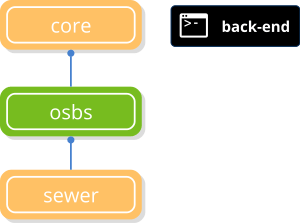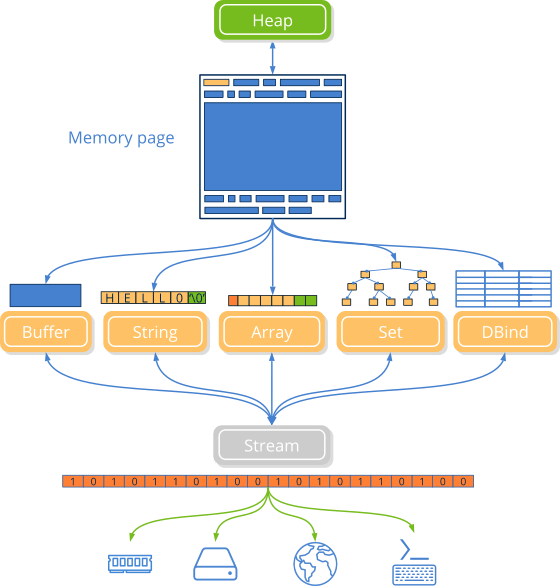Core
This page has been automatically translated using the Google Translate API services. We are working on improving texts. Thank you for your understanding and patience.
A strong core will improve your technique, strength, endurance and will complement everything you do. Susan Trainor
Header
#include <core/core.h>
Functions
| void | (*FPtr_remove (...)) |
| void | (*FPtr_event_handler (...)) |
| type* | (*FPtr_read (...)) |
| type* | (*FPtr_read_ex (...)) |
| void | (*FPtr_read_init (...)) |
| void | (*FPtr_read_init_ex (...)) |
| void | (*FPtr_write (...)) |
| void | (*FPtr_write_ex (...)) |
| void | (*FPtr_size (...)) |
| void | core_start (void) |
| void | core_finish (void) |
Types and Constants
| DeclSt | |
| DeclPt | |
| enum | core_event_t |
| enum | sstate_t |
| enum | vkey_t |
| enum | mkey_t |
| enum | token_t |
| enum | dbindst_t |
| struct | Buffer |
| struct | String |
| struct | ArrSt |
| struct | ArrPt |
| struct | SetSt |
| struct | SetPt |
| struct | Stream |
| struct | RegEx |
| struct | Event |
| struct | KeyBuf |
| struct | Listener |
| struct | IListener |
| struct | DirEntry |
| struct | EvFileDir |
| struct | ResPack |
| struct | ResId |
| struct | Clock |
Just as a building needs a strong foundation, any software project must be supported by robust and efficient pillars. For this purpose, the core library has been developed (Figure 1), which provides commonly used non-graphical utilities. In addition to being the basis of NAppGUI-SDK, it will also facilitate the development of our own programs and libraries, guaranteeing maximum efficiency and portability. core has no external dependencies, except Osbs, which will provide the elementary calls to the operating system.

The power of core lies in the efficient and safe management of memory, together with the automation of operations on objects and the management of collections based on arrays and binary search trees (Figure 2). All this would be incomplete without a robust serialization system, which allows us to export/import data from/to memory, using different communication channels.
- Heap. Paged memory manager with leaks auditor.
- Buffers. Generic dynamic memory block.
- Strings. Text strings in dynamic memory.
- Arrays. Collection of elements in contiguous memory locations.
- Sets. Container that optimizes the search, insertion and deletion of elements.
- Data binding. Automation of operations on objects.
- Streams. Input and output channels. Incorporates a text parser to read tokens.

Additionally, core provides these utilities:
- Regular expressions.
- Events. Base for the event management subsystem.
- File operations. File and directory utilities.
- Resource packs.
- Dates. Date/time related functions.
- Clocks. Accurate time measurement.
DeclSt
Enables macros for compile-time type checking in Arrays and Sets. Usage: DeclSt(Type) immediately after the definition of the struct Type.
DeclPt
Same as DeclSt for pointer containers.
enum core_event_t
Event types in core library.
enum core_event_t
{
ekEASSERT,
ekEFILE,
ekEENTRY,
ekEEXIT
};
| ekEASSERT | Redirection of Asserts. |
| ekEFILE | A file detected while browsing a directory. hfile_dir_loop. |
| ekEENTRY | Entry in a sub-directory while we go through a directory. hfile_dir_loop. |
| ekEEXIT | Exit of a sub-directory. |
enum sstate_t
Streams state.
enum sstate_t
{
ekSTOK,
ekSTEND,
ekSTCORRUPT,
ekSTBROKEN
};
| ekSTOK | All ok, no errors. |
| ekSTEND | No more data on the channel. |
| ekSTCORRUPT | The data in the channel is invalid or has not been read correctly. |
| ekSTBROKEN | Error in the communication channel. |
enum vkey_t
Keyboard codes. See Using the keyboard.
enum vkey_t
{
ekKEY_UNDEF,
ekKEY_A,
ekKEY_S,
ekKEY_D,
ekKEY_F,
ekKEY_H,
ekKEY_G,
ekKEY_Z,
ekKEY_X,
ekKEY_C,
ekKEY_V,
ekKEY_BSLASH,
ekKEY_B,
ekKEY_Q,
ekKEY_W,
ekKEY_E,
ekKEY_R,
ekKEY_Y,
ekKEY_T,
ekKEY_1,
ekKEY_2,
ekKEY_3,
ekKEY_4,
ekKEY_6,
ekKEY_5,
ekKEY_9,
ekKEY_7,
ekKEY_8,
ekKEY_0,
ekKEY_RCURLY,
ekKEY_O,
ekKEY_U,
ekKEY_LCURLY,
ekKEY_I,
ekKEY_P,
ekKEY_RETURN,
ekKEY_L,
ekKEY_J,
ekKEY_SEMICOLON,
ekKEY_K,
ekKEY_QUEST,
ekKEY_COMMA,
ekKEY_MINUS,
ekKEY_N,
ekKEY_M,
ekKEY_PERIOD,
ekKEY_TAB,
ekKEY_SPACE,
ekKEY_GTLT,
ekKEY_BACK,
ekKEY_ESCAPE,
ekKEY_F17,
ekKEY_NUMDECIMAL,
ekKEY_NUMMULT,
ekKEY_NUMADD,
ekKEY_NUMLOCK,
ekKEY_NUMDIV,
ekKEY_NUMRET,
ekKEY_NUMMINUS,
ekKEY_F18,
ekKEY_F19,
ekKEY_NUMEQUAL,
ekKEY_NUM0,
ekKEY_NUM1,
ekKEY_NUM2,
ekKEY_NUM3,
ekKEY_NUM4,
ekKEY_NUM5,
ekKEY_NUM6,
ekKEY_NUM7,
ekKEY_NUM8,
ekKEY_NUM9,
ekKEY_F5,
ekKEY_F6,
ekKEY_F7,
ekKEY_F3,
ekKEY_F8,
ekKEY_F9,
ekKEY_F11,
ekKEY_F13,
ekKEY_F16,
ekKEY_F14,
ekKEY_F10,
ekKEY_F12,
ekKEY_F15,
ekKEY_PAGEUP,
ekKEY_HOME,
ekKEY_SUPR,
ekKEY_F4,
ekKEY_PAGEDOWN,
ekKEY_F2,
ekKEY_END,
ekKEY_F1,
ekKEY_LEFT,
ekKEY_RIGHT,
ekKEY_DOWN,
ekKEY_UP,
ekKEY_LSHIFT,
ekKEY_RSHIFT,
ekKEY_LCTRL,
ekKEY_RCTRL,
ekKEY_LALT,
ekKEY_RALT,
ekKEY_INSERT,
ekKEY_EXCLAM,
ekKEY_MENU,
ekKEY_LWIN,
ekKEY_RWIN,
ekKEY_CAPS,
ekKEY_TILDE,
ekKEY_GRAVE,
ekKEY_PLUS
};
enum mkey_t
Modifier keys.
enum mkey_t
{
ekMKEY_NONE,
ekMKEY_SHIFT,
ekMKEY_CONTROL,
ekMKEY_ALT,
ekMKEY_COMMAND
};
enum token_t
Token types on stm_read_token.
enum token_t
{
ekTSLCOM,
ekTMLCOM,
ekTSPACE,
ekTEOL,
ekTLESS,
ekTGREAT,
ekTCOMMA,
ekTPERIOD,
ekTSCOLON,
ekTCOLON,
ekTOPENPAR,
ekTCLOSPAR,
ekTOPENBRAC,
ekTCLOSBRAC,
ekTOPENCURL,
ekTCLOSCURL,
ekTPLUS,
ekTMINUS,
ekTASTERK,
ekTEQUALS,
ekTDOLLAR,
ekTPERCEN,
ekTPOUND,
ekTAMPER,
ekTAPOST,
ekTQUOTE,
ekTCIRCUM,
ekTTILDE,
ekTEXCLA,
ekTQUEST,
ekTVLINE,
ekTSLASH,
ekTBSLASH,
ekTAT,
ekTINTEGER,
ekTOCTAL,
ekTHEX,
ekTREAL,
ekTSTRING,
ekTIDENT,
ekTUNDEF,
ekTCORRUP,
ekTEOF,
ekTRESERVED
};
| ekTSLCOM | One-line comment, which begins with |
| ekTMLCOM | Multi-line commentary, enclosed between |
| ekTSPACE | Represents a series of blanks ( |
| ekTEOL | Represents the new line character ( |
| ekTLESS | Less than sign |
| ekTGREAT | Greater than sign |
| ekTCOMMA | Comma sign |
| ekTPERIOD | Point sign |
| ekTSCOLON | Semicolon sign |
| ekTCOLON | Colon sign |
| ekTOPENPAR | Opening parenthesis |
| ekTCLOSPAR | Closing parenthesis |
| ekTOPENBRAC | Opening bracket |
| ekTCLOSBRAC | Closing bracket |
| ekTOPENCURL | Opening curly bracket |
| ekTCLOSCURL | Closing curly bracket |
| ekTPLUS | Plus sign |
| ekTMINUS | Minus sign |
| ekTASTERK | Asterisk sign |
| ekTEQUALS | Equal sign |
| ekTDOLLAR | Dollar sign. |
| ekTPERCEN | Percentage sign |
| ekTPOUND | Pound sign |
| ekTAMPER | Ampersand sign |
| ekTAPOST | Apostrophe sign |
| ekTQUOTE | Quotation sign |
| ekTCIRCUM | Circumflex accent sign |
| ekTTILDE | Tilde sign |
| ekTEXCLA | Exclamation sign |
| ekTQUEST | Question mark |
| ekTVLINE | Vertical bar sign |
| ekTSLASH | Slash bar sign |
| ekTBSLASH | Backslash sign |
| ekTAT | At sign |
| ekTINTEGER | Integer number. Numbers. |
| ekTOCTAL | Octal number. Numbers. |
| ekTHEX | Hexadecimal number. Numbers. |
| ekTREAL | Real number. Numbers. |
| ekTSTRING | Unicode character string, enclosed in quotation marks. Strings. |
| ekTIDENT | Identifier. Identifiers. |
| ekTUNDEF | Unknown token. |
| ekTCORRUP | Error in the input Streams or data. |
| ekTEOF | End of the Streams or data. No more tokens. |
| ekTRESERVED | Keywords. Being of general purpose, the analyzer does not label any identifier as a reserved word. It must be done in phases after the analysis. |
enum dbindst_t
Return values in dbind.
enum dbindst_t
{
ekDBIND_OK,
ekDBIND_MEMBER_EXISTS,
ekDBIND_TYPE_EXISTS,
ekDBIND_TYPE_USED,
ekDBIND_ALIAS_SIZE
};
| ekDBIND_OK | Successful operation. |
| ekDBIND_MEMBER_EXISTS | The member of a structure is already registered in DBind. |
| ekDBIND_TYPE_EXISTS | The data type is already registered in DBind. |
| ekDBIND_TYPE_USED | The data type to be deleted is in use. |
| ekDBIND_ALIAS_SIZE | The size of an alias type does not match that of the original type. |
struct Buffer
Block of memory of general purpose, reserved dynamically. Once created, you can no longer resize. Buffers.
struct Buffer;
struct String
UTF8 character string reserved dynamically. They are "partially mutable" objects. The reserved memory can not grow, but characters can be substituted as long as the buffer's initial capacity does not overflow. Strings.
struct String;
struct ArrSt
Array of records. The type of object is indicated in parentheses. Arrays.
struct ArrSt;
struct ArrPt
Pointers array. The type of object is indicated in parentheses. Pointer arrays.
struct ArrPt;
struct SetSt
Set of records. The type of object is indicated in parentheses. Sets.
struct SetSt;
struct SetPt
Pointers set. The type of object is indicated in parentheses. Pointer sets.
struct SetPt;
struct Stream
Generic input/output channel, where it is possible to read and write formatted data. Streams.
struct Stream;
struct RegEx
Regular expresion. Regular expressions.
struct RegEx;
struct Event
Contains information regarding an event. Events.
struct Event;
struct KeyBuf
Keyboard buffer with the state of each key (pressed/released). Keyboard buffer.
struct KeyBuf;
struct Listener
Link to the generator and receiver of an event through a callback function Events.
struct Listener;
struct IListener
C++ interface for use class members as event handlers. Use of C++.
struct IListener;
struct DirEntry
Directory element, obtained by hfile_dir_list.
struct DirEntry { String* name; file_type_t type; uint64_t size; Date date; };
| name | File or subdirectory name, without path. |
| type | Item type. |
| size | Size in bytes. |
| date | Date of last modification. |
struct EvFileDir
Parameters of the event ekEFILE and ekEENTRY during automatic directory browsing. hfile_dir_loop.
struct EvFileDir { const char_t* pathname; uint32_t level; };
| pathname | The partial path from the parameter |
| level | The depth of the directory from |
struct ResPack
Package of resources that will be loaded together. Use ResId to access a specific resource. Resources.
struct ResPack;
struct ResId
Identifier of a resource. They are generated automatically by nrc NAppGUI Resource Compiler. Resources.
struct ResId;
struct Clock
It measures the time elapsed between two instants within the application, with micro-seconds precision. It is also useful for launching events at regular intervals of time.
struct Clock;
FPtr_remove
Releases the memory of an object's fields, but not the object itself.
void (*FPtr_remove)(type *obj);
| obj | Pointer to the object whose fields must be released. |
FPtr_event_handler
Event handler. They are callback functions that will be called by the generator of an event when it happens. Events.
void (*FPtr_event_handler)(type *obj, Event *event);
| obj | General data passed as the first parameter of the function. |
| event | The event. |
FPtr_read
Create an object from data read from a Streams.
type* (*FPtr_read)(Stream *stream);
| stream | The I/O channel where the object is serialized. |
Return
The created object, deserializing the stream data.
FPtr_read_ex
Create an object from data read from a Streams. Accepts external user data.
type* (*FPtr_read_ex)(Stream *stream, const dtype *data);
| stream | The I/O channel where the object is serialized. |
| data | User data (context) required in the read function. |
Return
The created object, deserializing the stream data.
FPtr_read_init
Similar to FPtr_read where the memory of the object has already been reserved, but not initialized.
void (*FPtr_read_init)(Stream *stream, type *obj);
| stream | The I/O channel where the object is serialized. |
| obj | The object whose fields must be deserialized. |
FPtr_read_init_ex
Similar to FPtr_read_ex where the memory of the object has already been reserved, but not initialized.
void (*FPtr_read_init_ex)(Stream *stream, type *obj, const dtype *data);
| stream | The I/O channel where the object is serialized. |
| obj | The object whose fields must be deserialized. |
| data | User data (context) required in the read function. |
FPtr_write
Write an object in a Streams.
void (*FPtr_write)(Stream *stream, const type *obj);
| stream | The I/O channel where serialize the object. |
| obj | The object to write. |
FPtr_write_ex
Write an object in a Streams. Accepts external user data.
void (*FPtr_write_ex)(Stream *stream, const type *obj);
| stream | The I/O channel where serialize the object. |
| obj | The object to write. |
FPtr_size
Returns the size of an object.
void (*FPtr_size)(const type *obj);
| obj | The object. |
core_start ()
Start the core library, reserving space for the global internal structures. Internally calls osbs_start.
void
core_start(void);
core_finish ()
Ends the core library, freeing the space of the global internal structures. Internally calls osbs_finish.
void
core_finish(void);


